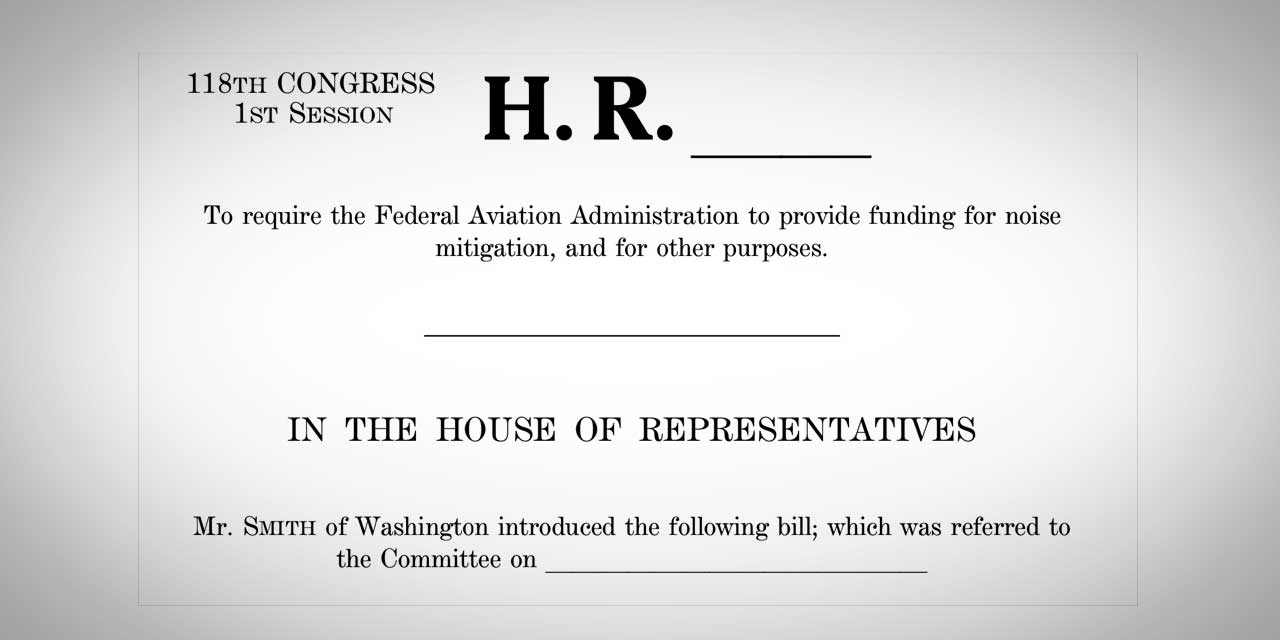Last week, Rep. Adam Smith (D-Wash.) introduced three pieces of legislation to help mitigate the impacts of aviation noise and emissions:
- The Aviation Impacted Communities Act
- The Aviation Noise and Emissions Mitigation Act
- The Protecting Airport Communities from Particle Emissions Act.
The Ninth District is home to several airports – including Sea-Tac – and impacted communities like Des Moines are left to deal with the negative effects of aviation noise and emissions pollution on their health and wellbeing with insufficient support.
“Many of my constituents in the Ninth District live near airports and airflight pathways. These communities are exposed to harmful noise and emissions pollution. We know that pollution from airplanes can lead to higher proportions of diseases and disproportionately burdens low-income communities and communities of color. This package of legislation will help us better understand the impacts that noise and emissions pollution have on communities and empower local leaders to effectively work with the Federal Aviation Administration towards solutions,” Smith said. “These communities have too often been left behind. It’s past time for the federal government to more closely engage with and support aviation impacted communities to make these neighborhoods safer, healthier places to live.”
Here are some reactions to Smith’s proposals:
“Thank you, Congressman Smith! The new science is consistently showing that airport noise and pollution is causing significant public health harm to airport communities. However, government and industry action are lagging behind. Congressman Smith’s three new bills lay the groundwork for leveling the playing field against resistant regulators and industry, by creating sensible policy to address the risks to public health from airport operations.” – Sheila Brush, Chair of Quiet Skies Puget Sound.
“These new bills will allow disproportionately impacted communities a new voice that can require government accountability; will mandate and support the collection of data so that science can better guide public health policy; and will support assessments and funding of community mitigation needs. The right legislation and the right time. Thank you, Congressman Smith!” – Steve Edmiston, Sea-Tac Airport Neighbor and Community Resident.
A fact sheet of the Aviation Impacted Communities Act can be found here. The bill text can be found here.
A fact sheet of the Aviation Noise and Emissions Mitigation Act can be found here. The bill text can be found here.
A fact sheet of the Protecting Airport Communities from Particle Emissions Act can be found here. The bill text can be found here.
The Aviation Impacted Communities Act is endorsed by the Congressional Quiet Skies Caucus, Quiet Skies Puget Sound, Beacon Hill Council, El Centro de la Raza, King County International Airport Community Coalition, and the Quiet Skies Coalition.
Statements of support for the Aviation Impacted Communities Act:
“We are pleased that our representatives are acknowledging and addressing health disparities in airport impacted communities. Bearing the burdens of health impacts and reduced quality of life from excessive noise and emissions is a debilitating life altering circumstance that has long been overlooked by regulators and only partially acknowledged by the aviation industry and FAA. We are hopeful this funding opportunity for research and intervention can help lessen these burdens.” – Quiet Skies Coalition
“Seattle’s Beacon Hill neighborhood lies under the flight path for SeaTac Airport and suffers from excessive aviation noise, which can increase stress, disrupt sleep, and lead to cardiovascular disease. We are not eligible for noise mitigation. The Aviation Impacted Communities Bill is a solution for many communities across the nation including ours.” – Maria Batayola, Chair of Beacon Hill Council
“Rep. Smith’s aviation impacted communities will help our beloved Seattle Beacon Hill neighborhood and other affected neighborhoods. We are under the flight path. Airplanes fly over us as often as every 90 seconds on the average. Seventy percent of inbound flights go over our heads. The noise is disruptive and bad for our health. There are many poor families including elderly who live in our Beacon Hill neighborhood. This bill will help relieve this unjust burden.” – Estela Ortega, Executive Director of El Centro de la Raza
“The Aviation Impacted Communities Act will provide strategies and support work to reduce and address harmful air pollution and noise pollutants. The WHO states that, “Clean air is a basic human right. Yet, air pollution continues to pose a significant threat to people worldwide- it is the greatest environmental threat to health and a leading cause of non-communicable diseases (NCDs) such as heart attack and stroke.” Airport communities have evidenced a disproportionate burden of negative health impacts from air and noise pollutants for generations. The harms done to residents of airport communities includes; higher rates of asthma and cancer, with far lower life expectancy rates compared to communities throughout the country. Where you live should not dictate your life expectancy due to the air you breathe.”– Ali Lee, Health and Equity Community Building Specialist
The Aviation Noise and Emissions Mitigation Act is endorsed by the Congressional Quiet Skies Caucus, Quiet Skies Puget Sound, Beacon Hill Council, El Centro de la Raza, King County International Airport Community Coalition, and the Quiet Skies Coalition.
Statements of support for the Aviation Noise and Emissions Mitigation Act:
“We believe that the bill will resonate with communities across the United States that feel the urgency to help their communities cope with the health impacts of airport and airpath flight noise and air emissions. This bill can be far reaching.” – Maria Batayola, Chair of Beacon Hill Council and Estela Ortega, Executive Director of El Centro de la Raza
Read the full letter of support from Beacon Hill Council and El Centro de la Raza here.
“The King County International Airport (KCIA) is located in King County, Washington. It is a major source of air, noise, lead, and climate pollution that disparately impacts neighboring communities… The Aviation Noise and Emissions Mitigation Act would protect our communities from harmful health impacts of these pollutants.” – Velma Veloria, Chair of King County International Airport Community Coalition
Read the full letter of support from the King County International Airport Community Coalition here.
The Protecting Airport Communities from Particle Emissions Act is endorsed by Quiet Skies Puget Sound, Beacon Hill Council, King County International Airport Community Coalition, and the Quiet Skies Coalition.
Statements of support for the Protecting Airport Communities from Particle Emissions Act:
“The UW Department of Environmental & Occupational Health Sciences has been a national leader in identifying, differentiating and mapping Ultrafine Particle emissions from aviation sources. I am honored to have been involved as an advisory board member with the many phases of this UW UFP MOV-UP (Mobile Observations of Ultrafine Particles) research. There is still much to learn and finding extremely poor health outcomes in residents living around Sea-Tac Airport in a 2020 King County community health profile makes it even more urgent to continue this type of research. I am grateful to congressman Smith for putting forward a bill that will aid in this pursuit. I look forward to continued research into relationships between noise and emissions from aviation sources and these alarming poor health outcomes.” – Debi Wagner, Chair of the Quiet Skies Coalition
“The Protecting Airport Communities from Particle Emissions Act is an important step in mitigating adverse health impacts on airport adjacent communities and helps to ensure that institutions can work together to build healthier communities. Communities who live adjacent and near the airports have the right to their well-being and this is an opportunity for institutions and government to help us reach that goal. It is important for me to know what harmful impacts are present, and how aircraft and airport operations are reducing their emissions because I live under a flight path, with a family member who has a chronic health condition and is immunocompromised. These compounding factors can certainly impact our lives.” – Sameth Mell, Aviation Community Activist


